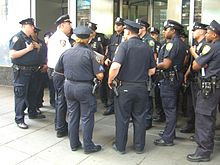
Law enforcement is the activity of some members of the government or other social institutions who act in an organized manner to enforce the law by investigating, deterring, rehabilitating, or punishing people who violate the rules and norms governing that society.[1] The term encompasses police, courts and corrections. These three components of the criminal justice system may operate independently of each other or collectively through the use of record sharing and cooperation. Throughout the world, law enforcement are also associated with protecting the public, life, property, and keeping the peace in society.[2]
The concept of law enforcement dates back to ancient times, and forms of law enforcement and police have existed in various forms across many human societies. Modern state legal codes use the term law enforcement officer or peace officer to include every person vested by the legislating state with police power or authority; traditionally, anyone sworn or badged who can arrest any person for a violation of criminal law is included under the umbrella term of law enforcement.
Although law enforcement may be most concerned with the prevention and punishment of crimes, organizations exist to discourage a wide variety of non-criminal violations of rules and norms, effected through the imposition of less severe consequences such as probation.
- ^ New Law Journal - Volume 123, Part 1 - Page 358, 1974
- ^ "Law Enforcement Code of Ethics". IACP. Retrieved 6 July 2023.